Introduction
Creating video games is intricate and demanding, requiring a blend of skills and specialized tools. Whether you’re a seasoned game developer or just beginning your journey, having the right game development tools in your arsenal can significantly impact your project’s success.
Game engines, programming languages, graphic design software, and audio editing tools are just a few examples of essential resources for game developers. These tools enable the creation of immersive, captivating, and visually stunning games that keep players engaged and coming back for more.
Today, the demand for high-quality video games has never been higher. Millions of players spend countless hours each year enjoying their favorite games across various platforms. As a result, game development companies, including those specializing in emerging fields like blockchain game development, must constantly push the boundaries to provide exceptional gaming experiences. This effort extends to metaverse NFT game development, Web3 game development, and custom blockchain development, where innovation and technical expertise play a crucial role.
Having the right tools in your toolbox is essential for streamlining workflows, enhancing game performance, and improving the player experience. Whether you’re developing a small mobile game or a large-scale PC or console game, from concept art to coding and debugging, the tools you choose will shape the outcome of your game. For instance, innovative contract development tools are increasingly vital as blockchain technology becomes more integrated into the gaming industry.
This article will explore some of the most crucial game development tools that can help you create high-quality games. We’ll cover everything from game engines and programming languages to asset creation and sound editing software. By the end of this article, you’ll have a comprehensive understanding of the resources you need to take your game to the next level, whether you’re working on a traditional game or one that leverages blockchain technology.
Here’s a breakdown of crucial game design, development, testing, and performance tools across various categories, essential for any game developer, including those in blockchain development:
CategoryToolDescription
Game Engines Unity A versatile game engine, ideal for both 2D and 3D game development, known for its user-friendliness.
Unreal Engine: A powerful engine favored for high-fidelity graphics, particularly for AAA games and simulations.
Godot is An open-source game engine that supports 2D and 3D game development with a community-driven focus.
Game Development IDEs Visual Studio Popular IDE for C# programming in Unity and other game frameworks.
Graphics and Art Tools Adobe Photoshop is an Industry-standard tool for creating visual assets like textures and sprites.
Sound and Music Tools FMOD Studio: A middleware solution for audio asset management and game integration.
Version Control Git Essential for tracking changes in game source code and collaborating with teams.
Game Testing Unity Test Framework Enables automated testing for Unity games to ensure gameplay mechanics work as intended.
Performance Monitoring Unity Profiler Tool to analyze and optimize the performance of Unity games.
Networking and Multiplayer Photon Framework is for real-time multiplayer game development and is ideal for synchronizing game instances.
UI/UX Design Tools Adobe XD A prototyping tool for designing interactive game interfaces and user flows.
Deployment and Packaging Steamworks Set of tools for integrating Steam features into games, including multiplayer and distribution.
CI/CD Jenkins Automation server for building, testing, and deploying game projects across platforms.
Whether part of a traditional game development company or focusing on the cutting-edge world of blockchain development, incorporating the right tools into your workflow can make a difference.
Essential Game Development Tools
The process of creating video games is intricate and necessitates a variety of abilities and resources. In this essay, we’ll examine the key game development resources that each and every game developer should possess.
Game Engines
The essential programme that drives a game is a game engine. For game makers, it offers a framework that includes tools for physics, graphics, animation, and more. There are numerous varieties of game engines, each with unique advantages and disadvantages. Unity, Unreal Engine, and CryEngine are a few examples of well-known gaming engines.
Cross-platform game engine Unity is capable of running both 2D and 3D games. It has a sizable user base, making it simple to get materials, guides, and help. Additionally, a variety of platforms, such as PCs, consoles, and mobile devices, are supported by Unity.
Another well-liked game engine that is appropriate for creating high-caliber, aesthetically attractive games is Unreal Engine. It has tools for building intricate game mechanics as well as sophisticated graphic capabilities. However, it requires more hardware horsepower to function properly and has a higher learning curve than Unity.
Powerful game engine CryEngine is renowned for its cutting-edge visual capabilities. It is suitable for creating excellent games with outstanding visuals. However, compared to Unity and Unreal Engine, it has a more difficult learning curve.
Integrated Development Environments (IDEs)
IDEs are software programmes that give developers a full development environment, replete with tools for testing, debugging, and modifying code. Additionally, they can support collaboration, version control, and project file management. Visual Studio, Eclipse, and Xcode are a few of the well-known IDEs for game development.
Developers frequently utilise Visual Studio, a well-liked IDE for game creation, to create games for the Windows operating system. It offers a large selection of features and tools for testing, debugging, and altering code. Additionally, it supports a large number of programming languages, such as Java, C++, and C#.
Another well-liked IDE for game creation that is commonly used by programmers to create games for several platforms is Eclipse. It offers a large selection of features and tools for testing, debugging, and altering code. Additionally, it supports a large number of programming languages, such as Python, C++, and Java.
Apple created the IDE Xcode to help programmers create games for the macOS and iOS operating systems. It offers a large selection of features and tools for testing, debugging, and altering code. Additionally, a large number of programming languages, such as Swift and Objective-C, are supported.
Graphics Editors
Graphics editors are crucial tools for developing a game’s visual components, such as character designs, animations, and backdrops. They enable the creation and editing of 2D and 3D visuals, as well as the addition of effects and picture manipulation. Adobe Photoshop, GIMP, and Blender are a few well-liked graphics editors for game production.
For the creation of exquisite, intricate 2D visuals, game creators frequently employ Adobe Photoshop. Layers, masks, and filters are just a few of the many features and tools it offers for manipulating images.
For the creation of 2D graphics, game developers frequently use the open-source graphics editor GIMP. Layers, masks, and filters are just a few of the many features and tools it offers for manipulating images. It is a popular option for independent game producers because it is also accessible for free.
Game developers frequently utilise Blender, a well-liked 3D graphics editor, to create 3D models and animations. The modeling, rigging, and animation features and tools it offers are numerous.
Partner with a leading game development company today!

Audio Editors
Audio editors enable developers to create and manipulate sound effects and music, two crucial components of any game. Music can be made with audio editors, which offer tools for recording, editing, and altering sound. renowned audio editors about game development tools like FL Studio, Audacity, and Adobe Audition.
Game developers frequently record and modify sound effects and music using Audacity, a free and open-source audio editor. It offers a variety of functions and tools for equalization, mixing, and noise reduction.
For recording and editing sound effects and music, game creators frequently use Adobe Audition, a professional audio editor. It offers a variety of functions and tools for equalization, mixing, and noise reduction.
Game developers frequently use FL Studio, a digital audio workstation, to produce music and sound effects. The capabilities and tools it offers for sequencing, mixing, and mastering are numerous.
Version Control Systems (VCS)
VCS are critical resources for tracking changes to game assets and code over time. They give programmers the ability to keep track of changes, interact with others, and go back to earlier versions if necessary. Git, SVN, and Perforce are some of the preferred VCS for game development.
Game developers frequently utilise Git, a distributed version control system, to manage their materials and code. It offers a variety of features and tools for merging, branching, and teamwork.
Game developers frequently utilise SVN, a centralised version control system, to manage their code and assets. It offers a variety of features and tools for merging, branching, and teamwork.
Game developers frequently utilise Perforce, a centralised version control system, to manage massive game projects. It offers a variety of features and tools for merging, branching, and teamwork.
Explore our other insights!
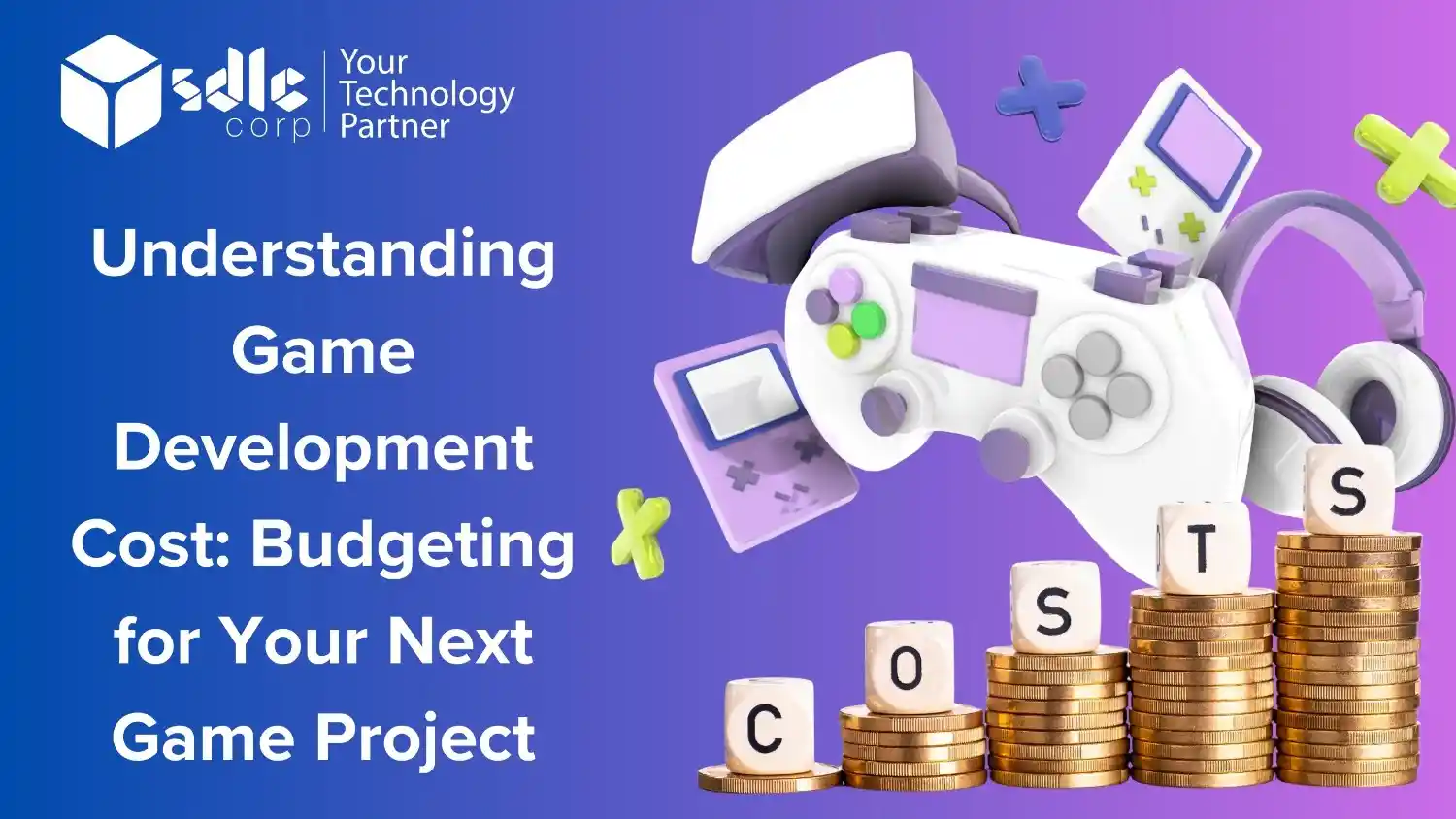
Understanding Game Development Cost: Budgeting for Your Next Game Project
Introduction Game development is a complex process involving stages such as pre-production, production, and post-production. These stages require

Game Development Outsourcing: Is It Right for Your Business?
Introduction Are you finding it challenging to keep up with the fast-paced demands of game development or struggling
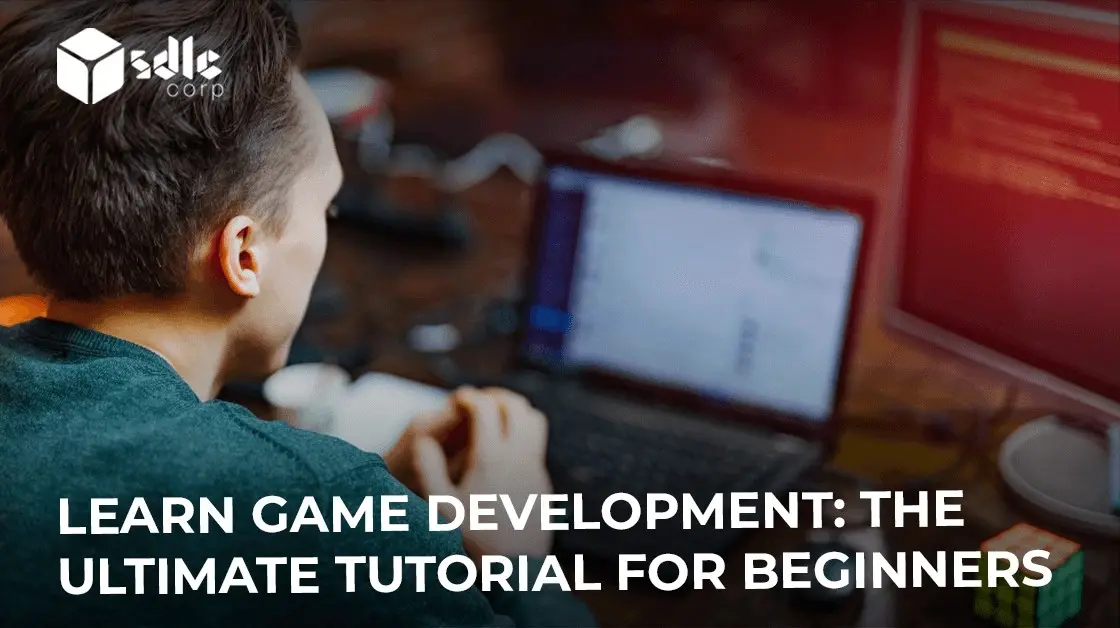
Learn Game Development: The Ultimate Tutorial for Beginners
Game development is a fascinating field that has gained popularity over the years. Finally, you have arrived at
Tools for Performance Analysis
For enhancing gaming performance, pinpointing bottlenecks, and raising frame rates, performance analysis tools are crucial. They offer real-time CPU, GPU, and memory utilisation monitoring and profiling. For the development of video games, popular performance analysis tools include Intel VTune, NVIDIA Nsight, and PIX.
Game creators frequently employ Intel VTune, a performance analysis tool, to optimise CPU performance. It offers a variety of features and tools for tracing, profiling, and examining the performance of programmes.
Game developers frequently use NVIDIA Nsight, a performance analysis tool, to enhance GPU performance. It offers a variety of tools and functions for tracing, profiling, and examining GPU performance.
Microsoft created PIX, a performance analysis tool, to enhance DirectX game performance. It offers a variety of tools and functions for tracing, profiling, and examining DirectX API calls.
Unlock innovation with a Web3 game development company!
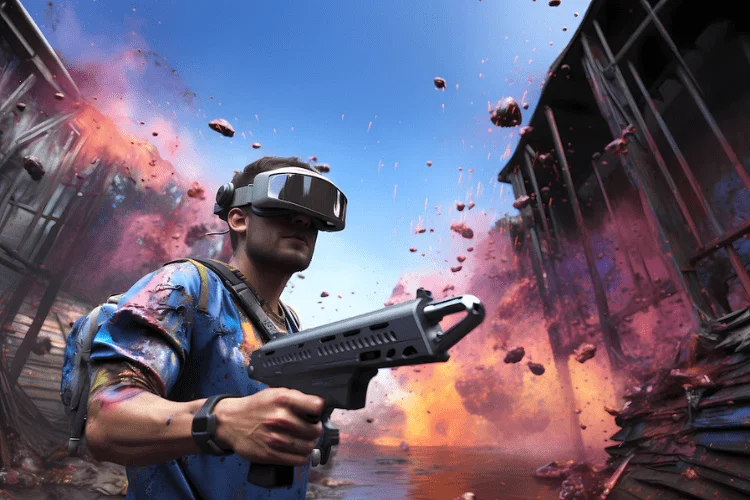
Benefits of Having Essential Game Development Tools
For game creators, having the necessary tools in their toolbox can have a lot of advantages, such as:
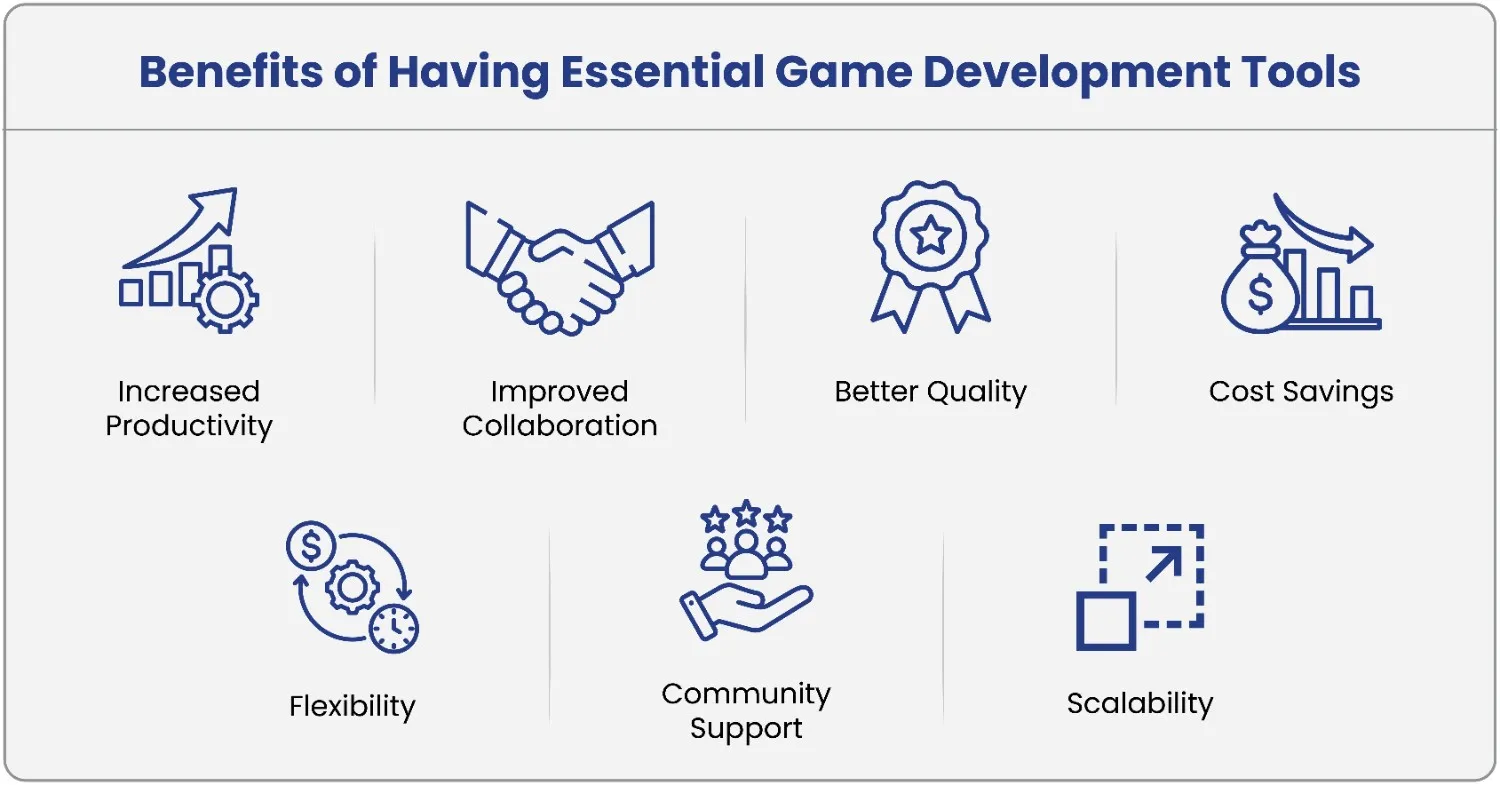
Increased Productivity
Having the appropriate tools can help game creators work more efficiently. Game makers can save a lot of time and effort by using game engines like Unity and Unreal Engine, which offer a variety of tools for designing, coding, and testing games. Additionally, code editing and debugging capabilities are offered by integrated development environments (IDEs) like Visual Studio and Xcode, which can aid developers in finding and fixing issues more rapidly.
Improved Collaboration
Collaboration can be improved thanks to the use of the appropriate tools since game creation is frequently a team effort. Developers may interact with other team members, manage changes to code and assets, and roll back to earlier versions as necessary using version control systems like Git and SVN. Teams can better organise tasks and communicate by using project management tools like JIRA and Trello.
Better Quality
A game’s quality is determined by a variety of elements, such as its graphics, soundtrack, and gameplay mechanics. While game engines like Unity and Unreal Engine offer tools for building complicated game mechanics and physics, developers may produce high-quality visuals and sound effects with the assistance of graphics and audio software like Adobe Photoshop and FL Studio. Game creators can improve game performance by using performance analysis tools like Intel VTune and NVIDIA Nsight to provide smoother gameplay and higher frame rates.
Cost Savings
Making games can be expensive, but using the correct tools can help you spend less money on it. As opposed to creating their own game engine or utilising pricey proprietary software, many game engines and software tools are either free or inexpensive, which can save creators money. Additionally, integrated development environments can shorten the time and expense of bug fixes by assisting developers in locating and fixing issues more rapidly.
Flexibility
Since game development tools are always changing, having a variety of vital tools in your toolbox will help you be more flexible when developing games. This implies that developers can move to another tool without having to start from scratch if one tool or technology is not appropriate for a given project. By doing so, developers can quickly adjust to changing project requirements and save time and effort.
Community Support
Popular game engines and software packages have sizable, vibrant developer communities that may be a great resource for help and information. Developers can use forums, blogs, and social media groups to exchange knowledge, ask questions, and pick up new skills. Additionally, this might assist creators to be updated with the recent trends and advancements in game production technology.
Scalability
Having the appropriate tools can assist game creators in scaling their games as their businesses expand. Multiplayer capability is supported by game engines like Unity and Unreal Engine, which can aid developers in making games that can accommodate a lot of people. Additionally, cloud-based platforms like Microsoft Azure and Amazon Web platforms (AWS) can assist developers in scaling their games to manage high volumes of traffic and data.
Hire dedicated game developers to boost success!
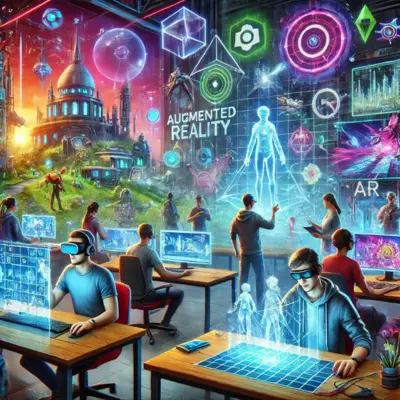
How SDLC CORP Use These Game Development Tools?
SDLC CORP is a leading game development company, specializing in creating mobile and web-based games. Their team utilizes a wide range of essential game production tools, from hardware and software to middleware and game engines, to ensure seamless development. In this section, we’ll explore how SDLC CORP employs these tools in their daily workflow to deliver high-quality games, including projects in blockchain and Web3 game development.
Hardware Tools
SDLC CORP handles the resource-intensive demands of game production using high-end PCs and workstations equipped with powerful CPUs, graphics cards, and substantial memory. This top-tier hardware allows their game developers to tackle complex and intricate projects with ease, increasing efficiency and productivity across the team.
In addition to standard hardware, SDLC CORP leverages specialized tools such as VR headsets and motion capture systems. These tools are crucial for creating immersive and interactive gaming environments, especially in innovative areas like metaverse NFT game development. Whether they’re working on traditional games or custom blockchain development projects, such as those involving smart contract development, these hardware resources help the team stay at the forefront of the gaming industry.
Software Tools
SDLC CORP relies on a diverse set of software tools to design, develop, and test their games. These tools include:
- Game Engines: SDLC CORP utilizes industry-standard game engines like Unity, Unreal Engine, and Godot. These platforms enable game developers to create visually stunning and performance-driven games efficiently. They are also essential for projects in blockchain development, such as Web3 game development, where integrating decentralized technologies into gaming ecosystems is crucial.
- 3D Modeling and Animation Tools: SDLC CORP creates characters, environments, and objects using powerful 3D modeling software like Autodesk Maya, Blender, and 3ds Max. These tools are essential for crafting the detailed and dynamic visuals that players expect, especially in blockchain game development projects requiring a blend of real-world economies and immersive graphics.
- Audio and Music Creation Tools: To deliver engaging soundtracks and sound effects, SDLC CORP employs professional-grade audio software such as Pro Tools and Logic Pro. High-quality audio enhances the overall gaming experience and is vital for any game development company looking to set their projects apart.
- Bug Tracking and Management: SDLC CORP uses software like JIRA to track and manage bugs during development. This helps the team quickly resolve issues and ensures smoother production timelines, vital for both small-scale mobile games and larger custom blockchain development projects.
- Version Control Systems: The company uses Git and SVN to manage their games’ codebase, enabling seamless collaboration between multiple developers working on the same project. This is especially important for teams working on blockchain game development, where the integration of decentralized elements like smart contracts requires careful coordination and precision.
Through the use of these hardware and software tools, SDLC CORP ensures that they can meet the needs of diverse gaming platforms, from traditional gaming environments to advanced blockchain-powered ecosystems. As a Web3 game development company, SDLC CORP leverages these resources to build immersive and innovative games that redefine the gaming experience.
Conclusion
In conclusion, having the right game development tools is crucial for creating a successful game. From game engines and programming languages to graphics software and audio editors, a game developer’s toolbox is filled with essential resources that can greatly impact the quality of the final product. For any game development company, including those specializing in blockchain development or metaverse NFT game development, selecting the appropriate tools and mastering their use can significantly enhance productivity and creativity.
Whether you’re working on a traditional game or exploring emerging technologies like Web3 game development, custom blockchain development, or smart contract development, using the right tools will ensure you deliver high-quality, engaging games. The tools you choose can help you optimize your workflow, improve performance, and create captivating experiences for players.
FAQs
1. What are some essential game development tools that every game developer should have in their arsenal?
Game engines like Unity, Unreal Engine, or Godot, programming languages like C++, C#, and Java, graphics programmes like Adobe Photoshop or GIMP, audio editors like Audacity or FMOD Studio, and version control systems like Git are some examples of crucial game production tools.
2. How do I choose the right game engine for my game development project?
Consider aspects like your talent level, the kind of game you want to make, the platform you want to target, and your budget when selecting the best game engine for your project. To gain a sense of how different game engines operate, research their features and capabilities and check out demos or tutorials.
3. Can I use free game development tools or do I need to invest in paid software?
Yes, you can utilise free game creation tools for tiny or independent projects like Godot or Unity Personal. Paid applications like Unreal Engine 4 and Unity Plus, however, can provide greater functionality, support, and scalability for bigger or commercial projects.
4. What are some programming languages that are commonly used in game development?
C++, C#, Java, Python, and JavaScript are a few of the programming languages that are frequently utilised in the creation of video games. The choice of language will rely on the needs of the project and the developer’s experience. Each language has advantages and disadvantages.
5. Am I supposed to be an expert in all the game development tools to create a game?
No, mastery of every game creation tool is not required. You can work more productively and get the outcomes you want, though, if you have a solid understanding of the tools that are pertinent to your project. By using practice, tutorials, and internet resources over time, you can pick up new information and develop your skills.



